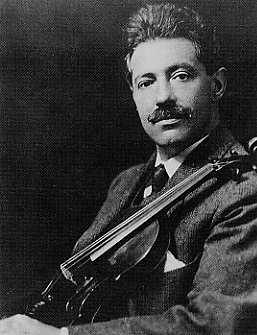OTHER LINKS:
Roots of Violinists
Index of Composers
Music Repertoire
Famous Violins
Violins He Played
Other
|
|
 Creativity
and beauty characterize Fritz Kreisler’s life. A world renowned
violinist and composer, Kreisler was born in Vienna on February 2, 1875.
He began studying the violin with his father, at the tender age of four.
Kreisler was then taught by the well reputed pedagogue, Jacob Dont, and
was accepted into the Vienna Conservatory at the age of seven. An
attentive pupil and a daring performer, Kreisler quickly captured the
Vienna Conservatory’s gold medal. He then worked under the direction
of Massart at the Paris Conservatoire.
Following his studies with Massart, Kreisler did not seek out further
instruction. He proved to be a virtuoso on the violin, and received
little formal direction after the age of twelve. Creativity
and beauty characterize Fritz Kreisler’s life. A world renowned
violinist and composer, Kreisler was born in Vienna on February 2, 1875.
He began studying the violin with his father, at the tender age of four.
Kreisler was then taught by the well reputed pedagogue, Jacob Dont, and
was accepted into the Vienna Conservatory at the age of seven. An
attentive pupil and a daring performer, Kreisler quickly captured the
Vienna Conservatory’s gold medal. He then worked under the direction
of Massart at the Paris Conservatoire.
Following his studies with Massart, Kreisler did not seek out further
instruction. He proved to be a virtuoso on the violin, and received
little formal direction after the age of twelve.
Kreisler’s life was as colorful and rich as his
music. As a young boy, Kreisler was interested in a career as a
violinist. However, he did not immediately meet with success. He was
introduced to American audiences in 1888, touring with pianist Moriz
Rosenthal. Although his technique was commended, Kreisler’ s musical
interpretations were not held in high standing. Somewhat disappointed,
Kreisler directed his energy into new fields, pursuing the study of
medicine, and abandoning the violin. He spent two years
in medical school, and then served in the Austrian army.
At the age of twenty-one Kreisler returned to the
violin. After a lengthy hiatus from his beloved violin, it took Kreisler
merely eight weeks of focused, secluded practice to reacquaint himself
with the instrument. Newly committed to building a career as a
violinist, Kreisler surmounted many initial setbacks, and strove toward
success. His debut was with the Vienna Philharmonic in 1898. Conducted
by Hans Richter, Kreisler’s performance with the Vienna Philharmonic
won the long awaited acclaim he deserved.
Sustaining the high caliber of his concert performances, Kreisler built
on his successes and later became known as one of the greatest
violinists of all time.
Kreisler moved to the United States during World War
II. Settling in New York, he refused to perform while the war continued.
Following the establishment, he quickly captured the attention of
American audiences. Although American critics had not responded well to
his playing when he toured as a boy, Kreisler now won great approval and
applause wherever he went. He toured in major cities throughout the
world, and continually charmed audiences with his wit and stunning
technique. Kreisler’ s final performance
was in 1947, at Carnegie Hall.
Known as one of the last great violinist-composers, Kreisler
published over one hundred and fifty compositions and arrangements. He
incorporated Viennese themes, Eastern scales, and stunning, harmonic
cadenzas into his works. An audacious young performer and composer, he
incited the wrath of music critics by confessing to the authorship of
“Lanner” and “Classical Manuscripts”. He had previously
published these works under the names of 18th
century composers in order to avoid the derision of critics.
A contemporary of Caruso and Paderewski, Kreisler was
affectionately known as the “King of Violinists”. An excellent
pianist, he was able to bring an understanding of sonorous chords into
his violin compositions. Kreisler’s timeless pieces continue to
delight and comfort. They express the imagination and character of a
truly extraordinary musician.
Notes by Shanaira Udwadia (May-2001) |